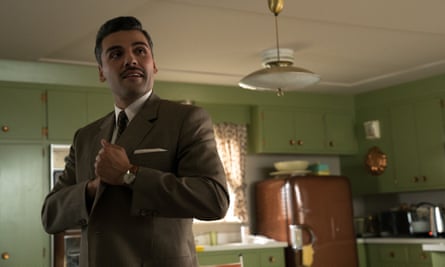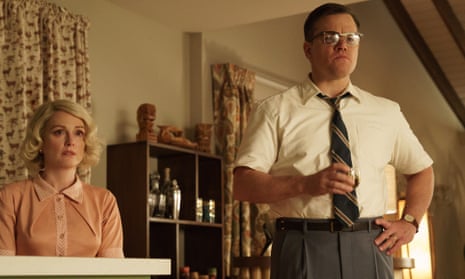For his latest directorial outing, George Clooney has given us a macabre comedy noir: watchable, lively, intricately designed, but with exotic plot contrivances and parallel storylines that don’t fully gel. Clooney and longtime producing partner Grant Heslov have rewritten an unproduced script by the Coen brothers, set in a satirically picture-perfect 1950s American suburb. Like the manicured locations of David Lynch’s Blue Velvet or Todd Haynes’s Far from Heaven, this is a place where ugly realities hunch behind the picket fence and the Colgate smiles: racism, deceit, murder.
The Coens’ original screenplay was about a intimately horrible act of violence and domestic betrayal that goes farcically wrong. Clooney and Heslov have added a separate strand, making this drama work a double shift, attacking America’s postwar prejudice. It takes as its starting point the real-life case of the black family who tried moving to Levittown, the notorious whites-only development established by real-estate mogul William Levitt – praised only this summer in a rambling speech by President Donald J Trump to a baffled audience of boy scouts (and I have to admit that the bizarre juxtaposition of subject matter and audience fits rather well with this film).

It is a tale of two neighbouring families: Matt Damon plays bland salaryman Gardner, whose workplace has offices with exactly similar spots for photos of family and loved ones: a very Coenesque touch. He lives with his disabled wife, Rose (Julianne Moore), but apparently quite close to her twin sister, Maggie (also Moore); they have a bright, lonely son, Nicky (Noah Jupe). Next door, an African American family have moved in, to the horror of the bigoted folks thereabouts: Mr and Mrs Mayers (Leith M Burke and Karimah Westbrook) and their son, Andy (Tony Espinosa), who is about Nicky’s age. Gardner’s family is to be torn apart by a grotesque act of violence, which is to necessitate a visit from a smarmy, seedy insurance investigator, Bud Cooper (Oscar Isaac). Meanwhile, a hateful mob with placards and Confederate flags gathers outside the Mayers’ house.
There is something weirdly, if perhaps not intentionally surreal about the way these two dramas unfold side-by-side without impinging on each other that much. Nicky makes friends with Andy without the local racists bullying them or confronting them. Of course, the racism that the Mayers have to deal with is arguably part and parcel of the bad faith and dishonesty unfolding in the community generally, and especially in Gardner’s house. Bud Cooper even says he’s getting home-insurance claims from people who consider a black neighbour a disaster. And yet as the story unravels into a wackily violent black comedy, it arguably undermines the serious issue of racism. And the Mayers are not allowed much or really anything in the way of dialogue. Set against it all is the eerie sense of time and place. The Stepford Wives and Husbands go about their business with malice in their hearts.

Comments (…)
Sign in or create your Guardian account to join the discussion